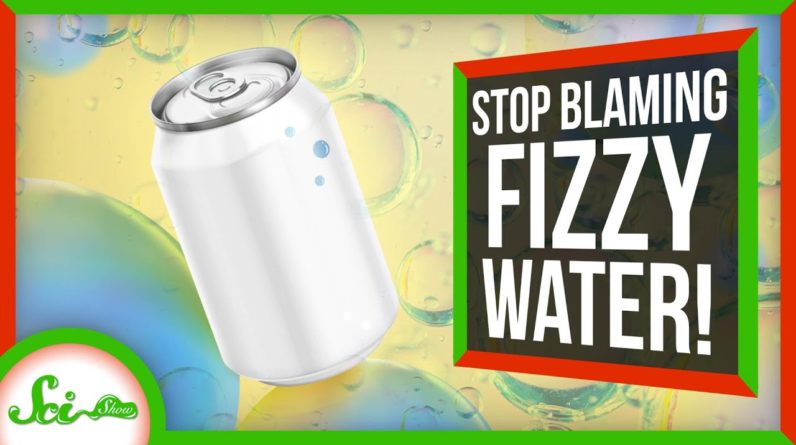
Thanks to Brilliant for supporting this episode
of SciShow. Go to Brilliant.org/SciShow to learn more
about their course The Chemical Reaction. [ ♪ INTRO ] As a species, we love carbonated drinks. The fizz on our tongues, the distinct stinging
and pungent sensation — bubbles can just make our drinks more fun. But carbonation also gets a bad rap. See, to make a fizzy drink, you need to saturate
your super cold liquid with carbon dioxide under high pressure. And when that CO2 dissolves in water, it creates
carbonic acid. According to the internet, that acid disintegrates
the enamel of your teeth or even causes kidney stones. Neither of which sounds any good! But the truth is, that isn’t carbonation
or carbonic acid’s fault. Instead, another acid is to blame — one
that isn’t found in bubbly water at all: phosphoric acid.
Phosphoric acid is a colorless, odorless acid
made from the mineral phosphorus. It gets added to dark-colored colas for flavor
because it’s tart, which helps balance the sweetness of all the added sugar. It also helps prevent bacteria and mold growth,
and those things can thrive in sugary mixtures. And they are not things we want in colas. Overall, phosphorous isn’t bad. It’s actually an important mineral for human
health. Our bodies use it for a slew of things, from
creating healthy teeth and strong bones, to maintaining kidney function, to storing energy. It’s even in DNA and RNA. But too much phosphorus can be a problem — especially
when it’s artificially added to food and drinks. A lot of foods are naturally phosphorus-rich,
but your body only partially absorbs this organic phosphorus. Meanwhile, your body absorbs 100% of inorganic
phosphorus that’s added to food and drinks — like the phosphoric acid in colas. And that can lead to an excessive amount of
it in the body. And that adds some consequences. For instance, phosphoric acid is thought to
cause kidney stones.
The most common of these are made from calcium
oxalate, and studies have found that phosphoric acid changes urine composition and causes
a rise in oxalate. This extra oxalate can then crystallize in
the bladder and cause kidney stones. Besides that, this acid also isn’t great
for your teeth: Since it’s acidic, it’s proven to erode the enamel of your pearly
whites. These are both things the carbonic acid in
bubbly water gets blamed for. But really, carbonic acid is much weaker than
the phosphoric stuff. I mean, it’s still an acid. And in a study, researchers did find that
sparkling mineral water dissolved slightly more tooth enamel than
regular water. But thanks to the lack of sugar and phosphoric
acid — plus all those extra minerals in there — it was also 100 times better than
soft drinks. And since carbonic acid also doesn’t contain
any phosphorous, that means it doesn’t increase your risk for kidney stones, either.

Now, don’t take all this to mean you should
never, ever under any circumstances drink cola. Like doctors say, moderation is key. But it does mean we can, thank you, please,
all stop blaming fizzy water. If you want to learn more about acid chemistry,
you can check out Brilliant’s course The Chemical Reaction after this. Brilliant keeps the explanations simple and
easy to follow in this course, and they focus on puzzles and patterns to help you understand
how reactions work and why.
Like their other courses, this one is also
available offline on their iOS and Android apps. If you want to check it out, you can go to
Brilliant.org/SciShow. And as our way of saying thanks, the first
200 people to sign up there will get 20% off an annual Premium subscription. [ ♪OUTRO ].







